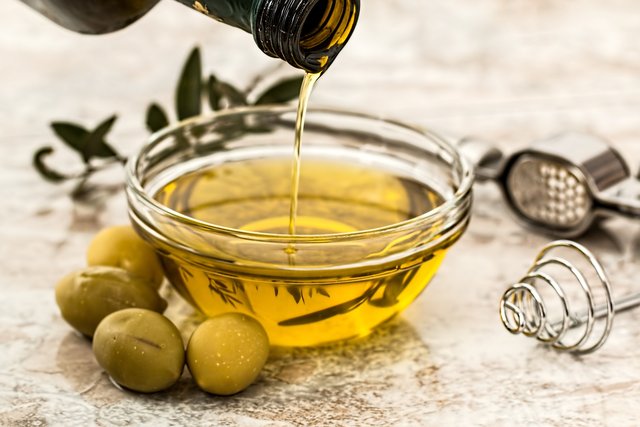We love healthy fats!

But how do you know which ones out there are the ones to be wary of? If you find it all confusing, you're not the only one!
Trans fats and saturated fats are thought to be problematic for our health, whereas unsaturated fats can actually help our health if we consume them in proper quantities.
So which are which?
Let’s talk briefly about the “bad guys” first, to get them out of the way…
Trans fats are widely believed to be the worst, with saturated fat coming in as a close second - at least when consumed in large quantities.
Trans fats and saturated fat are both known to be harmful, yet you’ll find them in a lot of products… Processed and fried foods, meals, and snacks are often where trans fats are hiding, so it’s important to check labels whenever you can and limit your intake to as little as you can possibly consume. Saturated fats are found in some meats (beef, pork, lamb), full-fat dairy products and butter, as well as things like palm oil, which is included in tons of processed foods.
Since these trans fats have no nutritional merit, meaning they can do only harm and no good, there’s no real reason to include them in your diet at all if you can help it. They are thought to exacerbate many health issues from high cholesterol to cancer - nothing I would personally want to risk! Saturated fats aren’t thought to be quite so bad, but still worth limiting just to be safe.
Now, about the “good guys!”
These are our unsaturated fats. They’re found in all kinds of foods that can easily become a part of your daily diet, and are worth investigating! Allowing these to take the place of some of the “bad guys,” aka the trans and saturated fats, in your diet can have some pretty remarkable effects.
There are two types of unsaturated fats to start looking out for: monounsaturated and polyunsaturated fats, and they each have their own set of healthful effects.
First we have monounsaturated fats - these include fats that are liquid at room temperature (think oils like olive and peanut), as well as avocados, nuts and seeds - they are thought to be able to assist with keeping our blood cholesterol levels in proper balance.
While consuming dietary cholesterol itself is now known not to have much effect on blood cholesterol levels, these healthy fats can actually help to lower your “bad cholesterol” (LDL) and raise your “good cholesterol” (HDL), resulting in a happier blood panel and reducing your risk of a stoke or heart attack. Trans fats on the other hand have the opposite effect, which is why it’s suggested to limit your intake of them.
Then come the polyunsaturated fats - these are our omega-3 and omega-6 fatty acids (both of which you’ve probably heard the most about), which come with a pretty impressive host of health benefits if added into your diet correctly.
These are found in fatty fish and fish oil, nuts and seeds, even some vegetables and vegetable oils - flaxseed oil in particular! These are considered EFAs, or essential fatty acids, because we can’t make them within our own bodies and therefore need to consume them through our diet. They can help lower our total cholesterol levels in our blood, which is a great effect!
Although not as much is definitively known about omega-6 fats and the proper amount to consume, when coupled with omega-3 fats in the proper amounts they’re thought to be heart-healthy… I am honestly not entirely sure what to recommend when it comes to these because there are a wide variety of opinions out there, but I do think it’s widely accepted that they can play a major role in heart health and general body functions if consumed in the correct proportions.
Omega-3 fats are awesome - you’ve probably heard that they can help reduce inflammation, but they can also lower blood pressure, help you burn fat and build muscle more efficiently, and more. Polyunsaturated fats like these are even thought to help control blood sugar and hunger, which would certainly be nice too!
The important thing about omega-3 and omega-6 fatty acids that we DO know, is that it’s not enough just to consume them daily and hopefully in place of saturated/trans fats… The ratio is also important.
Since it’s easy to get a ton of omega-6 fats from a western diet, many of us often get too many omega-6 fats from our diet and not enough omega-3 fats. I’ve read different ratios that are believed to be preferable here, but I think around 2:1 (omega-6 to omega-3) is a safe ratio to shoot for…
You can increase your omega-3 intake by incorporating a supplement into your routine, or replacing your usual protein source a few times a week with a serving of fatty fish. Chop up a few nuts to sprinkle on your yogurt, make a salad dressing or sauce with a little flax oil, or use some seeds to add crunch to your veggies and you’ll be on your way to getting more of the healthy fats your body needs to function its best in so many ways!
Just because some fats are healthy though, doesn’t mean you should go out and eat pounds of nuts every day, eat only fish for every meal, or drench your food in vegetable oils… Just like everything in health and fitness, it’s all about balance. Don’t forget that these “better” fats are still fats, and do carry a caloric cost - adding them to your diet with wild abandon can have consequences that affect not only affect your waistline, but also your health!
As with all recommendations I make here, please talk to your doctor before implementing any major dietary changes - everyone is wonderfully unique and special, and all bodies are different! I always try to err on the side of caution and only suggest things I believe to be widely and generally beneficial, but if you’re not sure if something is right for YOU, then you should definitely do more of your own research and talk to a medical professional who knows your history before proceeding. Duh.
Anyway, I hope you found this helpful, as simplified as it might've been!
Please feel free to comment, upvote, or resteem if you'd like! :)
.jpg)



Definitely increasing the omega 3 and decreasing omega 6 is great. Avoiding trans fat like the plague is a good idea! Thanks for the post.
Downvoting a post can decrease pending rewards and make it less visible. Common reasons:
Submit
You're welcome, glad you liked it! :)
Downvoting a post can decrease pending rewards and make it less visible. Common reasons:
Submit
very good post @annemariemay👍
Downvoting a post can decrease pending rewards and make it less visible. Common reasons:
Submit
Thanks so much, @hennessy!! :)
Downvoting a post can decrease pending rewards and make it less visible. Common reasons:
Submit
Nicely said, but I want to share some info: Saturated fat is not essentially harmful. when compared to unsaturated fat, it has been linked to an increase in some risk factors for heart disease, but not directly to heart disease itself.
By only focusing on nutrients are not enough, overall diet and lifestyle also matters most.
Downvoting a post can decrease pending rewards and make it less visible. Common reasons:
Submit
Thank you for clarifying! That's important information to note, I should've been more clear about that... And I think that's great advice about overall diet and lifestyle - I hope the rest of my posts collectively emphasize that as well! Thanks for the thoughtful comment :)
Downvoting a post can decrease pending rewards and make it less visible. Common reasons:
Submit
mmmm healthy fats....bacon....bacon....bacon...lol. Avocado, Almonds, olive oil, and bacon....mmm. lol
Downvoting a post can decrease pending rewards and make it less visible. Common reasons:
Submit
Hahaha the best things in life, right!? Mmmmmm....
Downvoting a post can decrease pending rewards and make it less visible. Common reasons:
Submit
LOL that is for sure! :)
Downvoting a post can decrease pending rewards and make it less visible. Common reasons:
Submit
Valuable information, you guys are always keeping it real 😎👊🏾
Downvoting a post can decrease pending rewards and make it less visible. Common reasons:
Submit
Thanks so much, @gflfitness! You're the best! 💖
Downvoting a post can decrease pending rewards and make it less visible. Common reasons:
Submit